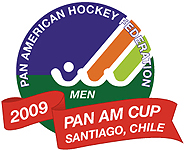2009 Pan American Cup |  |
Revenge for Argentina?
The 3rd Men’s Pan American Cup will start on Saturday March 7 in Santiago, Chile, in the superb facilities of the Prince of Wales Country Club where the 2008 Olympic Qualifier was played. At stake is not only the continental crown but also a qualification for the 2010 World Cup in New Delhi for the winner, as well as invitations to one of the three World Cup Qualifiers. Just like the Women’s Pan American Cup a month ago, the competition has dwindled down to only eight teams after some countries had to withdraw because of the current financial crisis, a trend that might sadly affect our sport in the near future. Currently 9th in the FIH World Rankings, Argentina is the highest ranked team in the competition, but are still shaken from their traumatic non-qualification for the Beijing Olympic Games after losing to Canada in the Pan American Games (penalty-stroke shoot-out) and to New Zealand in the Olympic Qualifier (overtime Golden Goal). They nevertheless had the luxury to immediately start rebuilding by participating in the 2008 Champions Trophy in Rotterdam, where they finished third after beating Australia and The Netherlands, no small feat in front of the Dutch home crowd. Argentina has a balanced team. Half the squad won the 2005 Junior World Cup together and they benefit from the extensive international experience of Mario Almada (241 International Caps), Matias Vila (197 Caps) and Matias Paredes. The Argentinean game is always spectacular and a crowd pleaser; it will be interesting to see if they have mentally managed to push aside their recent international misfortunes when facing the tough challenges in the final stages of this competition. Not far from Argentina in the World Rankings, Canada was the only representative of the Americas in Beijing, where they had a mediocre showing and finished 10th. They have kept the core of their Olympic Team, led by a trio of seasoned warriors in Rob Short (277 Caps), Ken Pereira (271 Caps) and Paul Wettlaufer (215 Caps). They have nevertheless lost their mercurial goalkeeper Mike Mahood, who efficiently backstopped the Canadian team for more than a decade, and the lack of international experience in goal could be a drawback for Canada in this competition. Under their new coaching staff led by Alan Brahmst, Canada tried to optimize their preparation by sharing a training camp with a top German club team, a good way to expose their five rookies to the pace of international competition. Behind these two teams, which have shared the continental honours in the past, Chile and Trinidad & Tobago are very close to each other. Chile came out on top over Trinidad & Tobago after a spectacular Bronze Medal game at the 2007 Pan American Games in Rio (5-3). The Chilean Hockey Federation is running very strong national team programs and the squad for this competition is well balanced, with all players having international experience. They are led by Esteban Krainz (105 Caps) and Cristóbal Rodríguez (104 Caps), and have the reassuring presence of Mathias Anwandter in goal. Chile will also benefit from the support of the home crowd, although it didn’t seem to serve them well last year at the Olympic Qualifier, when they dropped critical games against Austria and Russia. Trinidad & Tobago were impressive at the last Pan American Games, nearly eliminating Canada in the semi-final (3-4 after overtime, after leading 2-0 within 10 minutes of play!). Their team is stacked with young and talented players and can count on the physical presence of Wayne Legerton up front, not to mention the talented leadership of Kwan Browne, certainly one of the most skilled players in the game. Respectively ranked 30th and 33rd in the world, the USA and Mexico arrive in this competition with fairly experienced squads and will try to regain a spot in the continental top four. The remaining two teams are young (average age 20 for Brazil, and five international rookies for Uruguay) and will come to learn and gain valuable experience, but the effort of their National Associations to keep developing the game should be mentioned and encouraged. The competition will be played in two pools (Argentina, Trinidad & Tobago, Uruguay and USA in pool A; Brazil, Canada, Chile and Mexico in pool B), followed by cross-over and classification matches, and will end on Sunday March 15.
| ||||||
| ||||||
| ||||||